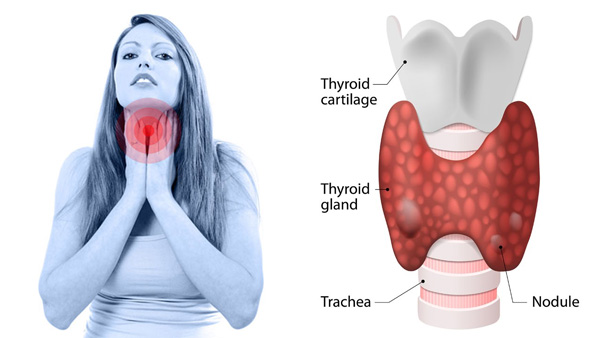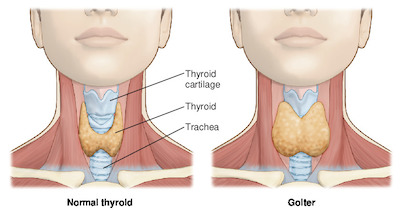Your thyroid is that little butterfly shaped gland just above the base of your neck. Its job is to produce hormones vital for bodily functions such as regulating metabolism and energy use. In fact, thyroid function impacts almost all organs of your body and more often than not symptoms of hypothyroidism crop up without many knowing it.

An underactive thyroid is a condition called hypothyroidism resulting in low production of the main thyroid hormones produced by the thyroid gland are thyroxine or tetraiodothyronine (T4) and triiodothyronine (T3). The main serum marker of hypothyroidism is increased TSH (thyroid stimulating hormone) which increases to force the thyroid to produce more thyroid hormones.
This can cause a number of health issues ranging from dry skin, constipation and digestive issues that become worse over time. If left untreated, more severe issues impacting organs may crop up. This can also lead to heart disease and issues of infertility. In the early or subclinical stage of hypothyroidism, you may not experience or notice symptoms that are often ignored or attributed to something else. Here are 12 signs and symptoms of hypothyroidism you need to look out for.
1. Fatigue
Among the common symptoms of hypothyroidism, fatigue is one of them. People experiencing it have reported feeling exhausted and not being able to go about their work as usual. Those with hypothyroidism can experience fatigue irrespective of rest or day time naps. A person’s functioning and energy levels can get back to normal only by treating the condition.
2. Weight gain
Thyroid hormones help regulate food intake, body weight, sugar, and fat metabolism in the body. A drop in the levels of thyroid hormone can lead to an increase in BMI (Body Mass Index) and surprising weight gain. People with hypothyroidism tend to have a puffy face and excess weight near the stomach and different parts of your body.

3. Sore muscles and joints
This condition even affects a person’s joints and muscles in several ways, such as:
- Pains
- aches
- pains
- stiffness
- swelling of the joints
- tenderness
- weakness
According to research, there is a relationship between thyroid disorders and rheumatoid arthritis, an autoimmune condition with painful swelling and inflammation of the joints. People should undergo proper treatment for both states to manage these symptoms.
Read: 6 foods that can fight inflammation and relieve joint pain
4. Mood and memory changes
People suffering from hypothyroidism without treatment may experience
- apathy, or general lack of interest or indifference
- anxiety
- depression
- impaired memory function
- less attentiveness and concentration
- low moods
- slower thinking and speech
Such symptoms of hypothyroidism are because of a lack of thyroid hormones required for the proper functioning of the brain. Research has proven that there can be changes in brain structure and functioning with low levels of thyroid hormone. Medication can reverse the symptoms.
5. Feeling cold
In hypothyroidism, low metabolic rates reduce your body temperature, making you feel cold. With low levels of thyroid hormones, people tend to have little tolerance towards the cold and feel cold most of the time. The cold feeling persists even when you are in a warm room during summer. Hypothyroidism can also create the sensation of cold feet and hands, or the entire body may feel cold. Anemia and poor blood circulation can also cause the same symptoms.
6. Constipation
Problems in digestion can be another symptom that is caused by hypothyroidism. Studies have reported that an underactive thyroid can cause issues in the movement through the gut and stomach, small intestine, and colon problems. People can experience constipation due to these digestive changes. According to doctors, constipation is defined as a condition where a person has less than three bowel movements in one week. A person can experience difficulty in passing stool, hard stool, and a sensation where the rectum doesn’t get empty.
7. High cholesterol
The thyroid plays a significant role in removing the excess cholesterol from the liver present in the body. A decrease in the hormone levels can cause the liver not to function properly and lead to an increase in the cholesterol levels in the blood. Research has concluded that more than 13% of individuals suffering from high cholesterol have an underactive thyroid. Experts have recommended that patients with high cholesterol should be routinely tested for hypothyroidism. Medication prescribed by a doctor automatically reduces cholesterol without the need for drugs to reduce it.
8. Slow heart rate
People diagnosed with hypothyroidism tend to have a slower heart rate, also known as Bradycardia. The heart can be affected by low thyroid levels in various ways, such as:
- blood pressure changes
- variations in heart rhythm
- less elastic arteries
Bradycardia among hypothyroidism symptoms also causes breathing, weakness, and dizziness. Without medication, a patient may suffer various heart complications like high and low blood pressure and even risk cardiac arrest.
9. Hair loss, the first symptom of hypothyroidism
Hypothyroidism and other hormonal problems can lead to hair loss if the disorder remains untreated. Thyroid hormones play a significant role in the growth and maintenance of hair follicles. Hair loss due to hypothyroidism occurs in most parts of the body like the scalp, eyebrows, hands, and legs.
People with thyroid problems are also inclined to develop alopecia, a condition where patches of hair fall from your scalp. These are one of the first symptoms of hypothyroidism.
10. Dry skin and weak hair and nails
An underactive thyroid can also cause dry, coarse skin, paleness and thin, scaly skin
A person suffering from hypothyroidism may experience rough, dry, brittle hair, dry skin, and even weak, brittle nails that easily break off. Thyroid hormone medication or therapy cures or reverses these symptoms.
11. Goiter

Goiter is another symptom of hypothyroidism where the thyroid gland swells at the base of the neck. In fact goiter is a swelling of the thyroid gland caused by both hypothyroidism and hyperthyroidism. One of the most common causes of goiter formation worldwide is iodine deficiency. Symptoms of goiter are:
- Cough
- Lump in neck
- Neck vein swelling.
- Dizziness when you raise your arms above your head.
- Hoarseness
- Problems swallowing and breathing
Various problems in the thyroid can cause goiters like iodine deficiency and autoimmune disease where the thyroid gland gets damaged and stops the production of hormones, known as Hashimoto’s thyroiditis. An underactive thyroid and iodine deficiency, less common in the States, can cause this condition
12. Menstrual changes
Those with an underactive thyroid may experience heavy or irregular menstrual periods or spotting between periods as one of the symptoms of hypothyroidism.
People having an underactive thyroid can suffer from irregular or heavy menstrual periods. The Society of Menstrual Cycle research stated that hypothyroidism even affects the hormones that play a significant role in the menstruation cycle by:
- Impairing the detoxification of estrogen
- Reducing the amount of reproductive hormone-binding globulin.
Hypothyroidism usually affects women and people over 60 years of age. It is necessary for those with signs or symptoms of hypothyroidism to see a doctor who will decide if you need medication or not. Hypothyroidism medication involves synthetic thyroid hormones that are safe and effective given the right dose. One treatments are started, the hypothyroidism symptoms gradually reduce.
Click here for a pdf booklet on Hypothyroidism
Click here for a pdf booklet on Hyperthyroidism .